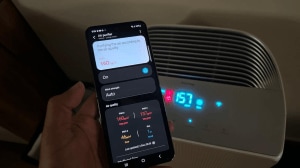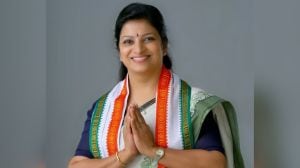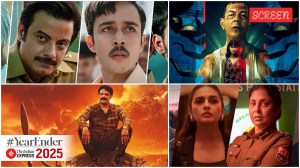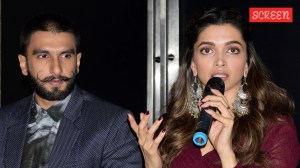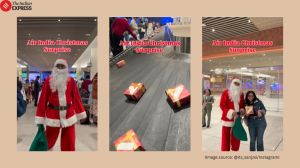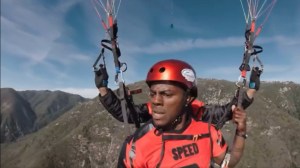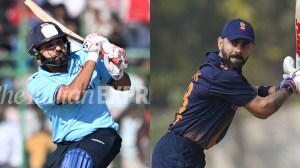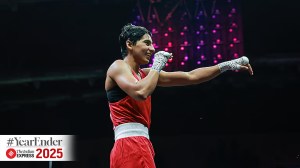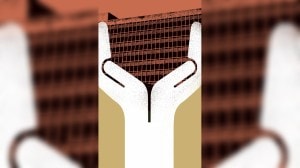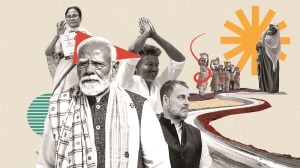At Close Range
...

Then the crack of a bullet, and a burst of birds from the patchy grass, rocks and twigs that lie within the range8217;s stone walls. Nana Patekar slowly lifts his face from the cheekpiece of the Anschutz.
8216;8216;Ten?8217;8217; he asks.
His fellow shooter looks through the scope. Fifty metres away, six wooden frames bearing pale yellow cards are lined against a wall. Patekar8217;s target is the black circle centred on one such card.
8216;8216;Ten point eight.8217;8217;
Patekar8217;s famously intense eyes swing back to the peep site of the 8 kg rifle. Later, the actor8212;the angry, trigger-happy man of Indian cinema8212;explains that 10.9 is the maximum score, so 10.8 is 8216;8216;almost bullseye8217;8217;.
Earlier this month, Patekar qualified for the National shooting championships to be held in Indore in October. It is his first shot at the event, for which he began practising five months ago. He now trains five days a week at the MRA range in Mumbai, rising at 5.30 am to be driven down to the Worli seaface in his white Mitsubishi Lancer by 8 am. He typically practises till 11.30.
8216;8216;It is quite painful,8217;8217; Patekar says, wincing as he rises after completing the first round of 10 shots. 8216;8216;Slowly, gradually, pain goes.8217;8217; A pause and the famous toothy grin. 8216;8216;It is there always, but you get accustomed to pain.8217;8217;
The left arm with which he holds the rifle, the actor explains, sometimes 8216;8216;gets numb, totally paralysed, din bhar lagta hai ki haath hai hi nahin8217;8217;.
|
NANA ON NANA
|
|
| 8226; On his gun: 8216;8216;What I like about this gun is the total colour of this gun. Gun means wooden.8217;8217; The newer guns, he admits, are better, 8216;8216;but they look like toys8217;8217; 8226; On his stamina: 8216;8216;I can8217;t go beyond 20 bullets at one stretch. It8217;s not possible to sustain the position so long.8217;8217; Champion shooters, he adds, can go up to 35 8226; On his shoes: 8216;8216;This is just Nike, but they8217;re like a glove.8217;8217; The specially designed, square-fronted shoes some shooters wear, he explains, give more stability |
Patekar typically fires 100 shots during one practice session. At Rs 10.50 a bullet, 8216;8216;it8217;s 1,000 rupees a day minimum8217;8217;. He nods towards fellow shooter Arun Wareshi, the gold medallist in the 2003 National Championships. 8216;8216;And he8217;s working with the Railways8230; Unfortunately he can8217;t afford to shoot. He8217;s our national champion.8217;8217;
For years, lack of money8212;and then of time8212;prevented the actor from pursuing his interest in shooting. As a child, he had wanted to join the army. In order to make Prahaar, his 1991 movie about a disillusioned army major, he joined the Maratha Light Infantry for two years in the mid-1980s. 8216;8216;The inclination towards shooting must be in my blood,8217;8217; he says. 8216;8216;This is an individual game.8217;8217;
His highest score, so far, is 553 out of 600. He8217;s touched 570 in practice sessions, 8216;8216;but that is not counted because the moment you enter competition, your palpitation, attitude changes8217;8217;.
When the 58217;118217;8217; Patekar lies prone on the ground to shoot, the black-and-brown Anschutz with its lean, clean lines seems to be an extension of the actor, an extra limb. The sinewy 54-year-old body is the result of rigorous workouts, two hours every day in his home gym. 8216;8216;Since the last 30 years, I8217;m 70-72 kg,8217;8217; Patekar says, sharing a breakfast of vada and idli with Wareshi.
They scrutinise the yellow card at which Patekar has been firing. Jagged holes gape between the seventh and ninth rings. The duo are joined by two visitors, an aspiring film-maker with a goatee and a pock-marked event manager. 8216;8216;Zeroing the practice round chal raha hai,8217;8217; Patekar tells them.
He returns to the shooting position. The event manager pussyfoots near the blanket where Patekar lies and crouches on his haunch. Hands clasped under his nose, he trains his eyes on the actor with implacable earnestness.
The bark of bullets, the tinny fall of spent golden casings, the twist of smoke from the slot out of which the cartridges are ejected. With every shot, the earnest event manager8217;s head swings in disbelieving amazement. The round over, the yellow card is brought for inspection. The bullseye is a massive hole.
Patekar gives an ecstatic yell. Ai hai. He slaps Wareshi on the back.
8216;8216;Kya baat hai,8217;8217; the pock-marked event manager says, smiling. 8216;8216;Khushi ho gaya dekh kar. Aap pehle karte, sir, toh kya ho jaate. I8217;m not flattering, but fact is fact.8217;8217;
8216;8216;Ekdum mast,8217;8217; the goateed film-maker says, smiling. 8216;8216;I8217;m amazed. It8217;s a huge distance. It8217;s a different high altogether. Woh dekh kar mujhe pata chal raha tha, I can imagine what you feel.8217;8217;
Patekar is helped out of his Capapie shooting jacket. He wrings a blood-red hand. He rotates his wrists.
8216;8216;If I shoot like this in competition, then gold medal nakki milegi,8217;8217; he says. He carries the Anschutz to the rifle case. Laying it on its foam bed, he says, 8216;8216;I feel like I8217;m holding my child.8217;8217;
- 01
- 02
- 03
- 04
- 05








